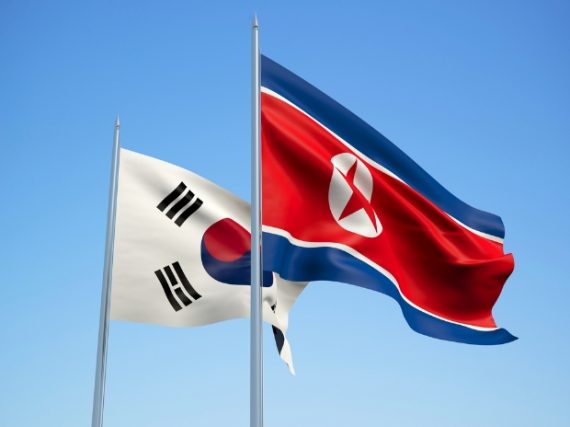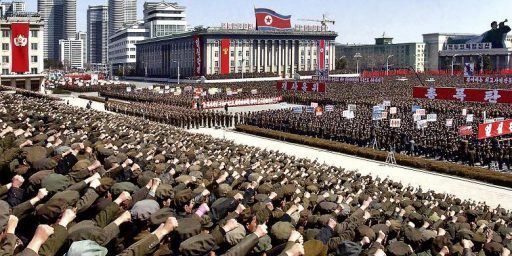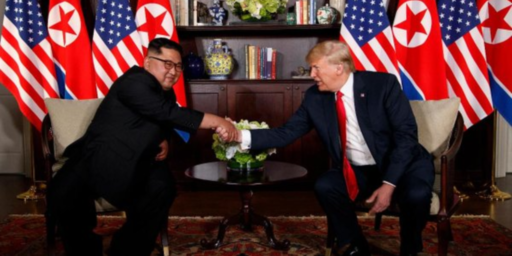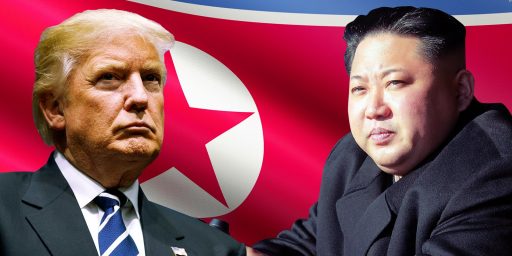Many South Koreans Not So Thrilled With The Idea Of A Unified Korea
The recent cooling of relations between North and South Korea has led to some talk of eventual reunification, but for many South Koreans that idea is a non-starter.
Over the past month, we’ve seen something of a rapprochement between North and South Korea that has been a distinct turn from the often inflammatory rhetoric that we saw for much of the last three or four years, and most especially over the past year after Donald Trump became President of the United States. The process began on New Years Day when North Korea’s leader King Jong Un used his traditional beginning of the year address to extend an olive branch to the Republic of Korea. Among other things, Kim suggested in that speech that the two nations reopen a mutual dialogue that had largely ended when the DPRK began taking a more belligerent tone toward its neighbors and, most especially toward the United States. During those years, the north escalated its nuclear weapons and ballistic missile research programs, including several underground tests of ever more powerful atomic and, so they claimed, thermonuclear weapons and launches of missiles on test flights that have shown progress toward a rocket that could carry a nuclear payload to the mainland United States. This olive branch led to the first joint talks between the two nations in nearly a decade. These meetings led to several developments such as the re-establishment of a military hotline between the two nations that had been s shut down by the DPRK and an agreement that will allow North Korean athletes to participate in next month’s Winter Olympics, with both nations marching together during the Opening Ceremonies at the start of the games. Additionally, the two nations agreed that they will have a joint women’s hockey team during the games. This plan has been approved by the International Olympic Committee and would mark a return of a tradition that began at the 2000 Summer Olympics in Athens and happened again at each Olympics until roughly the Winter Olympics in 2006.
While these developments have been seen as mostly positive by parties around the world, even by President Trump who apparently pressured South Korean President Moon Jae In to give Trump credit for the thawing of relations, they haven’t been entirely positively received on the southern side of the Demilitarized Zone. The announcement of the joint Olympic team, for example, drew some South Koreans to protest the developments, which they see as capitulation to the Ki regime. The developments have also, perhaps inevitably, stirred speculation about Korean unification, something that has been largely unthinkable since the Korean War ended sixty-six years ago. As The New York Times notes, though, South Koreans don’t seem especially thrilled about that idea:
SEOUL, South Korea — The last time South Korea hosted an Olympics, in 1988, the North not only refused to take part, it blew up a South Korean airliner 10 months before the Games. Yet South Koreans at the time expressed hope that the two Koreas, divided by the Cold War, could one day become a single nation again.
Now, as the South prepares to host its second Games next month, the Koreas are cooperating in unheard-of ways, including their first joint Olympic team, in women’s ice hockey. But South Koreans, especially younger ones, are far less interested in reconciliation, to say nothing of reunification.
Experts and recent surveys describe a profound shift in attitudes in South Korea, where reuniting the peninsula, and the Korean people, was long held as a sacrosanct goal. These days, younger South Koreans in particular are far more likely to see the idea of reintegrating their prosperous capitalist democracy with the impoverished, totalitarian North as unrealistic and undesirable.
“I personally wouldn’t welcome reunification because it would create a burden for us, as we would have to help rebuild the North Korean economy,” said Park Min-cheol, 22, a college student.
Young Koreans say they are more concerned about pressing domestic issues — like unemployment, and whether they can live as well as their parents did — than the enormously costly, complex and hypothetical task of reunifying with the North. The reunification of Germany in 1990 serves to some as an example of how arduous, and expensive, rejoining two very different societies can be, and the economic gap between the two Koreas today is much wider than it was between East and West Germany.
In polls, fewer respond to the old appeals to common ethnic heritage, much less the shrill, propagandistic calls for reunification put forth by North Korea, whose 34-year-old dictator, Kim Jong-un, they both ridicule and fear.
A survey last year by the government-run Korea Institute for National Unification in Seoul found that far more South Koreans in their 20s now oppose reunification — 71.2 percent — than support it. Across the population, support has dropped to 57.8 percent from 69.3 percent just four years ago.
“Especially men in their 20s, about half of them, consider North Korea an outright enemy,” said Kim Ji-yoon, a research fellow at the Asan Institute for Policy Studies in Seoul who has been tracking attitudes toward reunification. “To young South Koreans, North Korea is someone they don’t want anything to do with.”
Polling experts say that South Korean men in their 20s often get more hawkish after they finish their mandatory military service.
The skepticism was apparent this month, when the two Koreas set aside their disputes over the North’s nuclear weapons and missile programs and agreed to field a joint team in the Winter Games in the town of Pyeongchang, and to march together in the opening ceremony on Feb. 9.
In the past, such gestures triggered waves of pro-unification sentiment, as in 2000, when North and South Korean athletes marched together at the Games in Sydney, Australia. (They competed separately.) The administration of President Moon Jae-in, a progressive who has long supported inter-Korean unity, hoped this latest rapprochement would create similarly warm feelings.
Instead, a survey found that more than 72 percent of South Korean adults overall — and more than 82 percent of those in their 20s and 30s — were not enthusiastic about the hockey team. More than 54,000 people signed a petition opposing it, and many expressed anger that some South Korean players would cede their positions to North Koreans.
“I am taken aback,” said Kim Sung-hwan, a former South Korean foreign minister. “Young people seem to think of North Korea as strangers who barge into their party bringing with them nothing but empty spoons.”
Such pushback would have been expected from conservatives, who have long been suspicious of efforts to engage the North. But younger South Koreans tend to be politically progressive and supportive of Mr. Moon on other issues.
Analysts said that years of increasingly provocative nuclear and missile tests have darkened South Korean perceptions of the North and its young leader, Mr. Kim. Actions like Mr. Kim’s executions of his own uncle and his half brother have also made the regime look brutal and grotesque.
“We know that this sudden shift in mood could be confusing for people, especially given how unsettled they were over the North’s missile tests up until just a month ago,” said Yoon Young-chan, a spokesman for Mr. Moon. “But the Pyeongchang Olympics can go beyond South-North reconciliation and provide clues to easing tensions and building peace on the Korean Peninsula.”
Analysts say a key turning point in attitudes toward the North came in 2010, when a South Korean naval ship was sunk by an apparent North Korean torpedo attack, killing 46 sailors, and North Korea launched a rocket barrage on a South Korean island that killed four people, including two civilians. These were formative events for young South Koreans, these analysts say.
(…)
Younger South Koreans don’t share the pain caused by the peninsula’s divide, or the inclination to see North Koreans as long-lost brethren. Last year’s survey by the unification institute found that while more than 47 percent of respondents in their 60s and older said the two Koreas must reunify “because they belong to the same nation,” less than 21 percent of respondents in their 20s said so.
Of course, warier views of the North are not limited to the young. Many South Korean conservatives, young and old, embrace the view that the North is building nuclear-tipped intercontinental missiles to drive a wedge between it and the United States, its longtime protector.
They fear that if Mr. Kim thinks the threat of a nuclear strike on the mainland United States will keep the Americans from intervening, he may try to take over the South, the dream that his grandfather, Kim Il-sung, the North’s founding leader, failed to achieve during the Korean War.
On Thursday, North Korean state media called on “all Koreans at home and abroad” to support moves toward reunification and eliminate obstacles created by “outside forces,” a reference to the United States.
Realistically speaking, of course, the idea of Korean unification is little more than a pipe dream at this point in time. The tensions on the peninsula may be temporarily reduced by the developments we’ve seen since the start of the year, but those developments have hardly resolved all of the outstanding issues between the north and the south. Additionally, it’s fairly clear that parties favoring such an idea on either side of the DMZ have a decidedly different idea of what reunification might look like. For the optimists in the south, reunification with the north would resemble something along the lines of what we saw with East and West Germany after the fall of the Berlin Wall, a peaceful reunification of two long-separated nations. In the minds of Kim Jong Un and those around him, and a constant part of the propaganda that the North spreads among its population, reunification would mean unification under the rule of Kim Jong Un, if necessary through the means of a military conquest that obviously would not happen. For that reason alone, speculating about reunification at this point is little more than fantasy.
Additional factors that ought to take the idea of reunification off the table for now are as much cultural as they are political. East And West Germany were divided for a just over fifty years, or an even shorter time if you consider the true date of the division to be when the Berlin Wall was constructed. Even after that division, though, there was still much that the two nations had in common in terms of culture, and after a time contact between civilians on both sides of the border. Even with those contacts, though, the division of the two nations had created differences in terms of culture and economics that had to be dealt with after the end of the Cold War meant that true unification took several years before it reached the point where we are today when a united Germany is led by someone who was born and raised in the east. One of the reasons for this was the fact that the Communist regime that ruled East Germany didn’t come close to the efforts to rewrite the culture of the east in the manner that the Kim regime has done in the north. Germans on both sides of the border came out of their division still sharing the same culture and history, and that made reunification far easier than many thought it would be.
The process would not be nearly so simple in the case of the two Koreas. First of all, North and South Korea have been divided for far longer than West and East Germany were prior to 1989. Even counting just from the time of the end of the Korean War in 1952, that division has been in place for sixty-six year and in reality, it has been in place since the post-war division of the two nations after the Second World War. During that time, and especially in the past thirty years, the south has evolved into a very Westernized, very wealthy country along the same lines as Japan. The south also is home to major companies such as Kia, Hyundai, Samsung, and others that give it a worldwide presence that has had a clear cultural impact on the south and on the generations that have been born and raised there. The north, by contrast, is much poorer, far less sophisticated technologically in which the people have spent the last seven decades being indoctrinated in an ideology in which they are indoctrinated virtually from birth until death. How much the average North Korean actually believes the nonsense the Kim regime teaches them is unknown since people are unable to speak for themselves without fear, but it’s clear that the collapse of the Kim regime would create a huge culture shock in the north that would take years, if not decades, to overcome. Indeed, the differences between the North and the South are so extreme that physical differences have manifested themselves, with the average North Korean being roughly three inches shorter than the average South Korean. This is a physical difference most likely linked to the poor diet of most North Koreans, and the fact that the nation has faced frequent famines due to crop failures and other factors. What all this means, of course, is that even if the Kim regime were to disappear today reunification is an idea that could not realistically be discussed for years if not decades.
On a final note, it’s not surprising that younger South Koreans would not be as welcoming of the idea of reunification as older generations. Unlike their parents or Grandparents, these South Koreans have no living memory of either the Korean War or a time when the peninsula wasn’t divided. Therefore, there is not the same sentimental link to the idea of a united Korea that you might see from someone older. Additionally, for the most part, these South Koreans have grown up in a nation that has been peaceful, prosperous, and democratic. The only disruptive element they have seen has come from the saber rattling by the DPRK, which openly threatens the nation’s most populated cities with military equipment stationed just on the other side of the DMZ. They have almost nothing in common with young North Koreans beyond a long-ago common ancestry. The longer the two nations remain divided, the more pronounced these differences are likely to become and the harder it will become to reunify them.







That’s been true for a long time. The cost of reunification will dwarf the German reunification. I don’t blame South Koreans for not wanting to pay, much less deprogram, reeducate and deal with what would be a long-term health crisis for those in the North.
Setting aside the daunting economic hurdles for a moment, the reunification of Korea still strikes me as an odd goal to pursue absent major positive changes on the Korean peninsula. German reunification happened because the DDR government acceded to internal and external pressures, allowed reformists to be elected, and essentially closed shop so that the BRD (West Germany) could absorb East Germany.
As a passive observer of Korea, from what I tell the major goal of the Kim regime is to keep the Kim regime in power. I don’t see the majority of South Koreans going along with that, let alone Japan and the U.S. signing on.
Let’s also keep in mind that the seeds of German reunification were planted, albeit semi-unwittingly, during the early 1970s with BRD Chancellor Willy Brandt’s Ostpolitik policies; which helped reduced tensions between East and West Germany in spite of vehement outcries from West German conservatives.
Some sort of Ostpolitk (or Nordpolitik in this case. I wouldn’t know the Korean term for it) would have to be successfully implemented between North and South Korea before any political reunification could even scarcely begin to be seriously realized.
@Surreal American:
I’m not sure that case applies to Korea. East Germany was a Soviet client state occupied by Soviet forces. Without the Soviet presence, Germany would have reunited much earlier. The same can’t be said for North Korea which is no one’s client state.
@Andy:
In addition, the Koreans had a very hot war between themselves in the Cold War era. That tends to keep the bitterness lingering.
Perhaps we should see the Korean peninsula not as an analogy of West and East Germany, but rather as Germany and Austria. Fundamentally two different countries sharing a language and some parts of their culture.
I doubt anyone on either side is really much interested in re-unification for the reasons Doug and several commenters above have mentioned. My take was that in this context talk of re-unification is a placeholder for some sort of peace deal between north and south.
I can’t imagine Kim putting nukes on the table, he’s risked too much to get them. Nor can I imagine that Kim would allow US forces to remain in situ in any deal, at least now without a considerable draw-down.
The pay-off for SK would be eased tensions – assuming they somehow achieved a level of trust. The pay-off for Kim would be international normalization. That’s a great deal for Kim, not much of a deal for the South. I know fwck all about SK politics but on its face I’d think such a deal could only be made if South Koreans were nervous enough to trade something big for not much return.